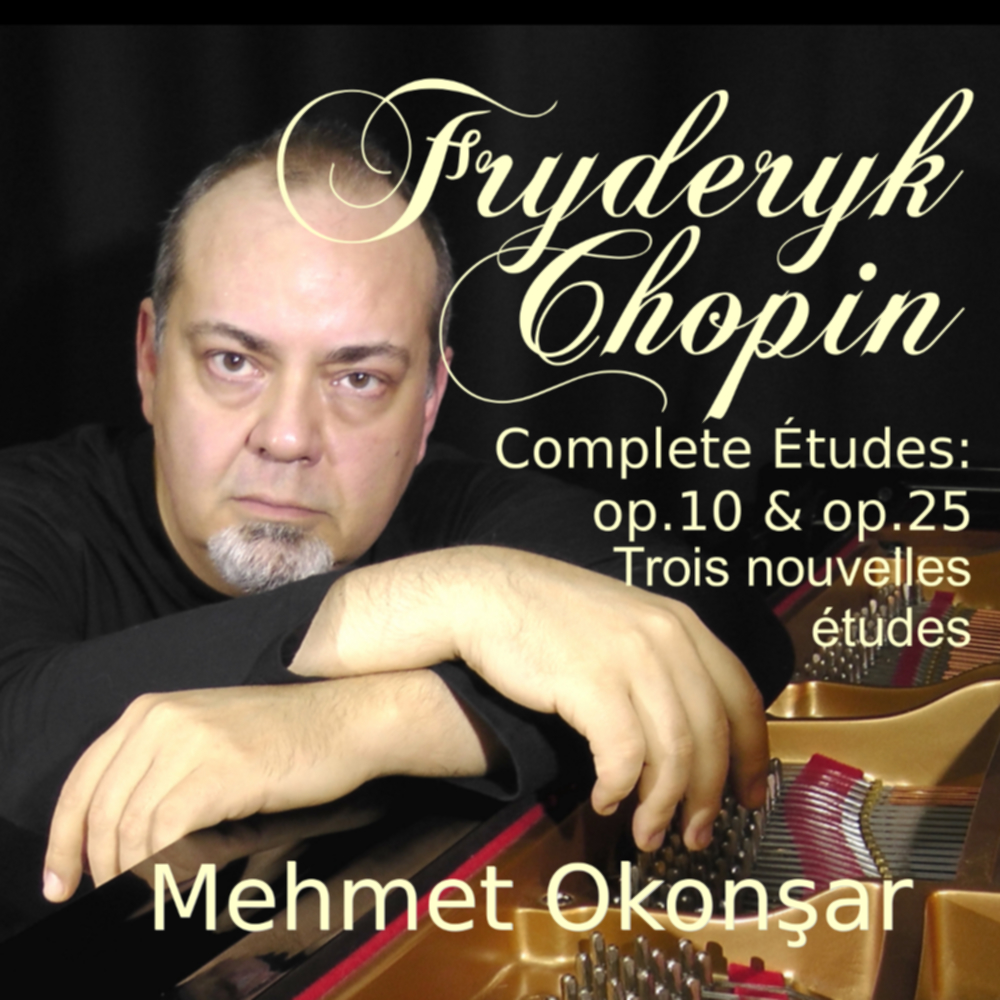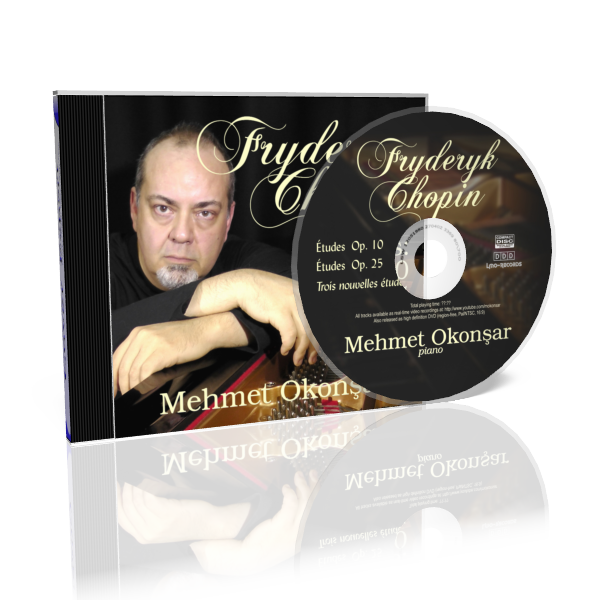
Frederic Chopin:
The Complete Etudes
Opus 10, opus 25 and "Trois nouvelles etudes"



|
My Recording Of The Chopin Etudes
There is something I find absolutely remarkable,
incomparable, in the Etudes by Chopin when compared to others in the
genre, like the ones by Liszt for example. With Chopin, there is an
impossibility to draw a line between the musical idea and the pianistic
one.Reflexions about the Etudes opus 10, 25 and the "Trois nouvelles etudes" by Frederic Chopin. I mean by that, generally, there is a musical concept on one side and a pianistic realization on another. With more or less success, composers did realize their musical ideas on the instruments of music or orchestra. In Chopin there is something out of the ordinary which only exists in a few other composers. That is, with Chopin, the musical idea seems to be born out of the pianistic thought without being subordinated to it. I mean by that, with the Studies by Czerny or Moscheles there are instrumental ideas with subject matters like arpeges, scales and so on. Then, those studies have taken a musical form, more or less genuine, which gave them their final aspect. With Chopin, of course we have those pianistic "subjects" like arpeges, thirds, sixths and so on that we all know, and there is the "musical idea", which itself is great, because it is a musical idea by Chopin. The correlation between this musical idea and the pianistic one is so dense and abundant that we cannot see where one stops and the other gets in. We have, for instance, great composers where the realization of the musical conception on the music instrument seems to be somehow forced. For example: Beethoven. Everything which makes Beethoven troublesome to play at the piano comes from the fact that he never submits his musical conception to the realities of the keyboard. His musical conception seems to be molded with constraint into the keyboard. On the other side, we have composers like Stravinsky where musical concepts (ideas) seems to be "made" for the instrument. We cannot distinguish where the instrumental realization of his musical concept do occurs. Where one starts, ends and the others starts? This is absolutely unattainable to see. At Chopin, especially in the Etudes we have that. We have a pianistic concept and we have a musical idea but the question: did the musical idea is born out of the instrument or the inverse remains wide open. No, the musical idea is not generated by the instrumental one, as that would have been the case with Moscheles, for example. So did the musical view fitted into a pianistic form instead? No, because that would have given the Etudes by Liszt, for example, which are terrific musical poems by themselves but they are not "etudes" in the classical meaning of it. So we have here a musical concept which has been simultaneously formed with the instrumental one. We can not see where one ends and the other takes in, they all seem one. This is what I find absolutely charming, in Chopin and specially in his Etudes. Born in Zelazowa-Wola, near Warsaw on the March 1st, 1810, died in Paris on the 17 October 1846, Frederic Chopin is at the same time the national glory of Poland and the "adopted" composer of France. According to Andre Gide, Chopin did mixed over a typically Polish root a not less common French style. His early years, spent in Warsaw have been centered on music. When he entered the Warsaw conservatory of music, at the age of 14 he seemed not needing to learn anything more about piano playing. When fifteen, he published "Rondo" op.1, his very first creation. Chopin journeyed to Vienna, Berlin, Prague during the years 1828-29. At the same time he enjoyed a good reputation of being the best pianist in Warsaw. "Zal" is a Polish term for a very special kind of nostalgic dreamy and melancholic feeling. An incredibly sensitive artist like the young Chopin got into it very soon. Frederic Chopin left Warsaw in 1830, just on the wedge of the Warsaw uprising. He settled down in Paris, devoting his time to creation and revealing. The concert career seemed inadequate for his temper. Chopin composed the majority of his most vital pieces at the home of George Sand in Nohant where he was spending the summer months throughout the years 1836-1840. Chopin's friends, in his "romantic" Paris of the nineteenth century were Delacroix, Liszt, Meyerbeer, Heine, Balzac. Disliking traveling, he once made a trip to Germany. He encountered Schumann and Mendelssohn. In his last year he also got to London once. The rather secluded life of Chopin is nevertheless a source of many stories and legends. Chopin's like affairs with Marie Wodzinska, his passionate liaison with George Sand and the image of a pianist and music composer which is graceful, sensitive and romantic are positively proper. On the other hand, the fabulous music usually used to enhance the stories, be it in the book reader's mind or in movies, also served a great deal to boost their appeal and effectiveness. He was buried, accompanied with his own "Marche Funebre" on October 30, 1849. His tomb is in the cemetery "Pere-Lachaise. "The music by Chopin is one of the most graceful ever created. By the very nature of his genius he refuses all categorizations." said Claude Debussy. Except for a few chamber music compositions, a book of seventeen songs op.74 and his diverse piano and orchestra compositions, among them the two beautiful Concertos op.11 and op.21, Chopin has generally been a "piano composer". Between his last musical sketching: Mazurka opus 68 n.4 just prior to his demise in 1849 and since the opus 1 "Rondo" of 1825, written when he was 14, Chopin almost exclusively authored for the piano, all the time and in all aspects of the musical instrument. With the massive list of his piano compositions, Chopin, unlike Liszt never followed or evidently displayed any literary connection with his musical creations. He was a follower of Mozart and Bach whose creations he kept studying all his life. "A romantic inspiration and sensitivity which shows up in a very classical formal structure" this is generally how all musicologists describe Chopin's genius. Even if it is very much elaborated, the music phrase by Chopin remains "simple", direct and highly successful. Chopin described several times that the simplicity must be goal in artistic creation. The ornamentation which he wanted to be performed as if improvised was an integral and structural piece of the melody. It was related to the ornamentation of the Italian singers as well as to the French "clavicembalo" style, specifically Francois Couperin to whom, Wanda Landowska did not hesitate to connect Chopin. The singers of the Italian Theater of Paris gave Chopin inspiration. He normally listened to them and loved their natural style and easy-going manners. "You need to sing if you wish to play the piano" he was saying to his pupils. Chopin was playing with an ideal equality of touch. That was the end product of an incredible mastering of the fingering and the touch. He wrote once: "as many sound as there are fingers, the thing is to know how to finger [numbering] them best." Another peculiar aspect of his playing was that unique "rubato" which has been broadly discussed. In his "Memoires", Berlioz wrote: "Chopin was unable to play regularly [i.e. keeping the beat], he pushed too far the rhythmical freedom of the melodic parts." Hector Berlioz, who never performed piano can be too severe when criticizing Chopin's playing "out of the beat". All who heard Chopin play said his "rubato" was continuously natural sounding, never too much, never in a pathos but elegant and refined. The peculiar "rubato" of Chopin is best described by Liszt. He made an analogy with the wind making the branches and leaves of trees oscillate, level forcibly at times, yet the trunks never moves with that. The music by Frederic Chopin is also characteristic with its harmonic sophistication and sophistication. The piano pedaling, in the music by Chopin gets, an importance never achieved before. Not only an accessory neither a utility, the pedal, with Chopin is one of the most fundamental tools in achieving expressibility.
|
|||||||||||||||||
| |
|||||||||||||||||
| |
|||||||||||||||||
|
|
|||||||||||||||||
|



